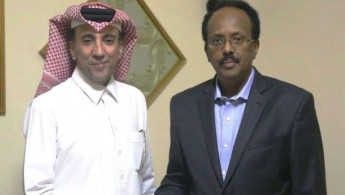Somalia rejects secret $80m bribe to stand against Qatar in ongoing boycott
The anonymous Gulf Arab minister had tried to bribe Somali President Mohamed Abdullahi Mohamed Farmaajo with a large sum of money to cut ties with Qatar, and to assist in facilitating the blockade against the small Gulf state, according to Jaber al-Harmi, journalist and previous editor in chief of Qatari newspaper Al-Sharq.
“The minister had even gone to the extent of trying to pressure Farmaajo through the help of another African country,” al-Harmi told The New Arab.
Meanwhile, Qatari foreign minister Sultan Bin Saad al-Muraikhi arrived in Mogadishu on Sunday, where he met with Farmaajo to discuss the escalating affairs in the region.
Mogadishu has refused to side with the UAE, Bahrain and Saudi Arabia in their diplomatic offensive against Doha, despite pressures from the anti-Qatar camp.
Severing ties
Saudi Arabia, the UAE, Egypt and Bahrain all cut off diplomatic contact with Qatar after officially accusing it of "sponsoring terrorism" last week.
In what appeared to be a coordinated move, foreign office officials alleged Qatar was responsible for supporting the Islamic State group and al-Qaeda "at all levels" in an unprecedented diplomatic spat for the Gulf region.
Riyadh announced on state television that Qatar would no longer participate in the Saudi-led coalition in Yemen, claiming Doha had helped support the Houthi rebels, despite Qatari soldiers dying in war against them.
Doha has vehemently denied the allegations, suggesting the decision to sever ties was pre-meditated and based on "fabricated claims".
Meanwhile, Kuwait has been leading efforts to reconcile between the disputing parties since the row escalated with an air, land and sea blockade of Qatar.
On Monday, Kuwait's foreign minister, Sheikh Sabah al-Khalid al-Sabah said Qatar is prepared to hold dialogues with the Gulf Arab countries that cut ties with it, noting that the embattled Gulf state is ready to listen to concerns.





 Follow the Middle East's top stories in English at The New Arab on Google News
Follow the Middle East's top stories in English at The New Arab on Google News
![The UAE is widely suspected of arming the RSF militia [Getty]](/sites/default/files/styles/image_330x185/public/2024-11/GettyImages-472529908.jpg?h=69f2b9d0&itok=Yauw3YTG)
![Netanyahu furiously denounced the ICC [Getty]](/sites/default/files/styles/image_330x185/public/2024-11/GettyImages-2169352575.jpg?h=199d8c1f&itok=-vRiruf5)
![Both Hamas and the Palestinian Authority welcomed the ICC arrest warrants [Getty]](/sites/default/files/styles/image_330x185/public/2024-11/GettyImages-2178351173.jpg?h=199d8c1f&itok=TV858iVg)